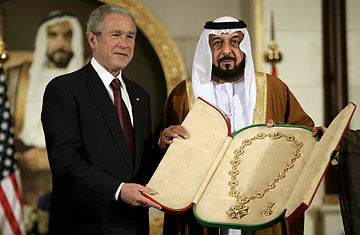
President George W. Bush receives a gift of a solid gold sash studded with diamonds and other gems from the President of the United Arab Emirates, Sheikh Khalifa bin Zayed Al Nahyan, at Al Mushref Palace in Abu Dhabi.
Oil wealth produces a signature style: call it crass class. The Kuwaiti Emir's residence, where President George W. Bush had dinner last Friday evening is, for example, a sprawling mix of gaudy contemporary art and expensive antiques. Loud paintings of harems and the ruling Sabah clan hang near Louis XVI enameled clocks and candlesticks in the long hallways. Enormous, overstuffed sofas squat on a collection of rare antique carpets in room after empty room. Behind the palace, two speedboats and a large yacht protected behind the Emir's man-made harbor obscure the otherwise lovely view of the Persian Gulf.
Oil money is everywhere here. And while it may seem like simple excess, there is a larger, more interesting point behind the fact that at Bush's stop last Sunday in Abu Dhabi the press lunch consisted of a dozen or so lavish dishes delivered sequentially on a 30-person service of monogrammed, gilt Limoges china. (The meal was delicious, thank you, but surprisingly none of the dishes was as good as the goat's brains from the buffet laid out by the palace of Sheikh Mohammed bin Rashid Al-Maktoum of Dubai on Monday). Back to the interesting part: amid all the excess, the Gulf is becoming a test case for the theory that oil wealth is a curse rather than a blessing when it comes to democratic development.
For years observers have argued that economic development can be hindered by oil wealth, a phenomenon called the "resource curse." Some, like Prof. Terry Karl of Stanford, say that excess oil exports also impede democratization. Tom Friedman of the New York Times even argues that democratization and the price of oil move in inverse proportion: when the price of oil goes up, he argues, crackdowns on political freedom ensue. Much academic ink has been spilled in pursuit of a model that can accurately link oil wealth and lack of freedom.
It may now be possible to propose a corollary theory: countries that greet American Presidents with the gaudiest displays of oil wealth tend to be the least democratic. In Abu Dhabi, Sheikh Khalifa bin Zayed presented Bush with an obscene necklace consisting of a number of increasingly large solid gold stars encrusted with scores of diamonds, rubies and emeralds. Though Bush talked up his "Freedom Agenda" there, his aides dodged questions about the fact that 50% of the country's parliament is appointed by Sheikh Khalifa, who is also the lifetime "President." Saudi Arabia, the most repressive of all the countries Bush visited on his trip, tried to outdo the "President Sheikh" Monday evening with a jewel-laden gold medallion dangling from a chain encrusted with rubies and emeralds.
In Bahrain, whose oil ran out a few years ago, all Bush got was a sword dance. Which was charming. It's not as if Bahrain doesn't have money — it just doesn't have obscene amounts of money from oil exports. Not coincidentally democratic reform has moved forward consistently over the last ten years, producing a new constitution and a bicameral parliament. A U.S. ambassador in the region says the relationship between oil wealth and democratic development explains the difference. "Bahrain has a large population that's unemployed and there are debates about resource allocation," he says. "If people can't participate in those debates, that's going to fuel tension and instability."
But it is not as simple as oil wealth equaling authoritarianism, let alone democracy fluctuating with the price of oil. The baby steps in Bahrain aren't in league with democratic development elsewhere in the world, and the trends there can hardly be considered permanent. More important, how do you account for oil-rich countries as diverse as Norway, Britain, Malaysia, Indonesia, Mexico and Venezuela? And would the theory apply to oil-rich states in the U.S.? Prof. Karl says oil and democracy don't mix when the black gold dominates a country's exports. "Countries that are most dependent on oil are the least likely to liberalize," she says.
The theory is holding up in the Gulf — almost. On the one hand, Saudi Arabia and Iran are not liberalizing, while Bahrain is. The outlier is Dubai. It is diversifying economically as its oil runs out, but has taken almost no steps to democratize. When Bush brought up the "Freedom Agenda" in private talks with Sheikh Mohammad, says National Security Advisor Stephen Hadley, all he got was a nod.
That doesn't mean countries won't pretend. It's harder these days not to have at least some democratic decoration. Which explains why oil-rich Kuwait may have attempted reforms but now, thanks to its enormous reserves, is finding it hard to stick with them. Bush touted the fact that two women have served in the Kuwaiti parliament since suffrage was extended to them 18 months ago. But it was inconvenient for the President to discover that both were appointed by the Emir rather than elected. Worse, one was hounded out of parliament in the face of impeachment hearings last spring, and the other is facing them now. Thanks to $100 oil, it seems, democratizing in the Gulf is like decorating here: more crass than class.
